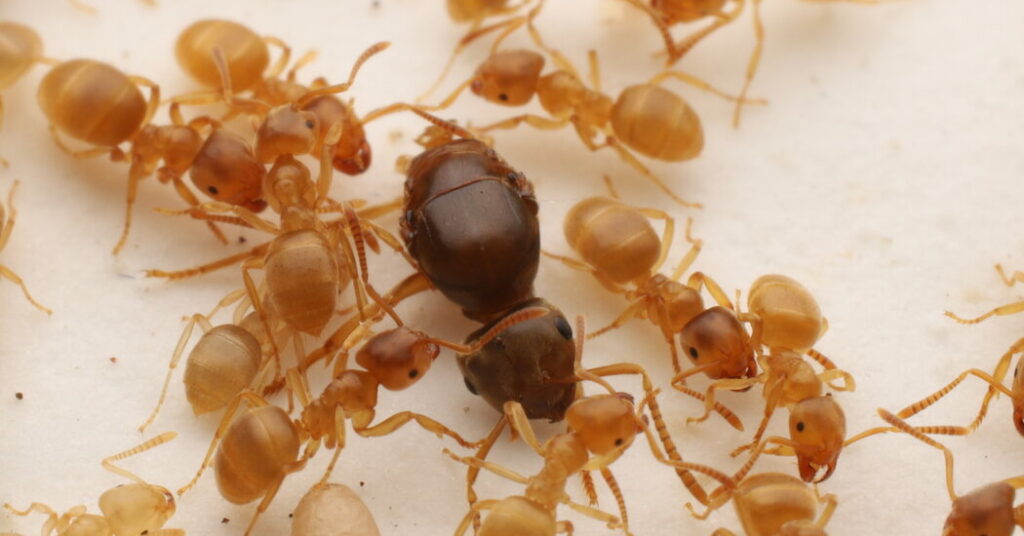The ant world is filled with Machiavellian dramas as the insects quest for control of colonies. Now experts have identified a kind of regicide that has never been documented before: Some parasitic ant queens can sneak into a colony and trick worker ants to kill their real queen, fomenting violent revolution against their own mother.
“It’s like a story out of ‘Game of Thrones,’” said Daniel Kronauer, an evolutionary biologist at the Rockefeller University in New York who was not involved with the study.
The discovery was made by an ant enthusiast in Japan and described Monday in the journal Current Biology.
Taku Shimada is not a scientist by training, but he has spent years observing, raising and learning about the insects. Ant researchers are familiar with his ant photography, his ant husbandry and his tenacity in traveling the world in search of rare ant species.
One day a few years ago, he found an ant queen of a parasitic species, Lasius orientalis, in a mountainous region in Japan. The species is known to take over the colonies of other ant species, but scientists weren’t sure how. So Mr. Shimada took the queen back to his home, set up a camera and introduced the queen to another species.
He watched in fascination as, over the course of several hours, the parasitic queen approached the colony’s true queen. First, it sprayed her with a substance — most likely defensive formic acid — and quickly retreated. That prompted the worker ants, which are the queen’s daughters, to begin biting her antennae, legs and abdomen.
Eventually, they killed the queen. The throne was empty.
In the wild, the parasitic queen would then return and lay her own eggs, with a horde of worker ants already in place to care for her young. He repeated the experiment with another parasitic queen-host species pair.
“I was very surprised and excited,” Mr. Shimada wrote in an email. “I never thought that daughters would attack their mother.”
He posted the findings in 2021 on his blog. Then last year Keizo Takasuka, an entomologist at Kyushu University in Japan who studies parasitism in spiders, came across the video.
“I lost my words when I saw the video,” Dr. Takasuka said. He brought Mr. Shimada’s novel observation to formal academia and is a co-author of the new study with Mr. Shimada.
That ant queens of one species can take over another species’ colony is not new; dozens of species have that behavior. But scientists know relatively little about how those takeovers happen because they happen underground.
“It’s very hard to observe,” Dr. Kronauer said. “So little is still known about the biology of these social parasites.”
Previous observations of queen-killing have been direct, queen-on-queen violence.
“They basically chop off her head and cut her into pieces,” said Rachelle Adams, an evolutionary biologist at the Ohio State University who was not involved in the new study.
Mr. Shimada’s experiments provide the first direct observations of a parasitic queen getting workers to do her dirty work.
The parasitic queen’s move is pretty risky. She has to sneak in, surrounded by workers who could detect her presence and attack, and retreat while panic ensues. But building a colony is hard work, and the rates of success are so low that it can be worth the risk.
“The parasite queen skips that initial phase and goes straight to having a lot of workers to care for their first brood,” Dr. Adams said. “She can use all the resources that are already in place and get her own colony up and running much faster.”
The study provides a small but important observation about an important step in ants’ life cycle.
“It wasn’t clear how queen-killing worked in this species, and now we have the first report that shows the parasitic queen actually manipulates the host workers into killing their mother,” Dr. Kronauer said.
He and Dr. Adams are excited for the ant research community to look for this newfound behavior in other species.
“This strategy is probably more frequent than we currently know,” Dr. Kronauer said.
The post Parasitic Queen: Now She’s Stealing an Ant Fief appeared first on New York Times.




